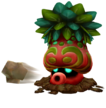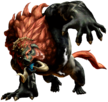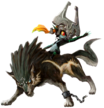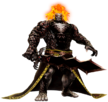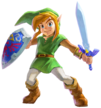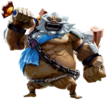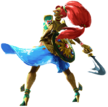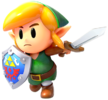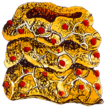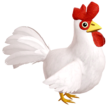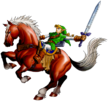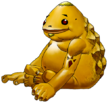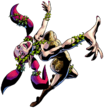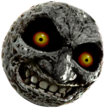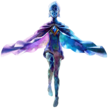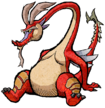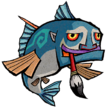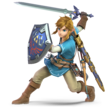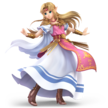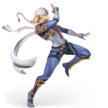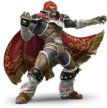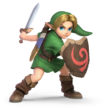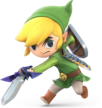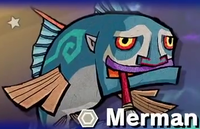| Spirit
|
Battle parameters |
Inspiration
|
| No.
|
Image
|
Name
|
Enemy Fighter(s)
|
Type
|
Power
|
Stage
|
Rules
|
Conditions
|
Music
|
| 178
|
|
Link (The Legend of Zelda)
|
•Young Link 
|
|
13,500
|
Find Mii (hazards off)
|
N/A
|
•The enemy's melee weapons have increased power
•The enemy's FS Meter charges quickly
•The enemy has increased attack power
|
Overworld Theme - The Legend of Zelda
|
Spirit Battle inspiration:
- The red Young Link represents Link's first incarnation in The Legend of Zelda, who is depicted as a young sword-wielding boy whose green tunic turns red when equipped with the Red Ring.
- The stage's background features dark storm clouds, referencing the story of The Legend of Zelda where the main setting of Hyrule has been plunged into darkness by the game's main antagonist, Ganon.
- The stage's background and the music track represent Death Mountain, a desolate mountain range located in the overworld of The Legend of Zelda which features the game's ninth and final dungeon.
- The stage represents the ninth and final dungeon of The Legend of Zelda, which features a castle-like setting where Princess Zelda is held captive by Ganon, similar to the Castle of Darkness in Find Mii II.
- Young Link's Triforce Slash Final Smash and the battle conditions reference the power of the Magical Sword, the most powerful sword in The Legend of Zelda which deals more damage than the regular Sword and the White Sword.
Other trivia:
- This spirit's Sword Attack ↑ ability further references the power of the Magical Sword in The Legend of Zelda, which deals more damage than the regular Sword and the White Sword.
- In World of Light, the Link (The Legend of Zelda) spirit is located on a mountain area in the Mysterious Dimension map in the Dark Realm, further referencing Death Mountain and the story of The Legend of Zelda where Hyrule was plunged into darkness by Ganon.
|
| 179
|
|
Octorok
|
•Diddy Kong Team  ×4 ×4
|
|
1,800
|
Great Bay
|
N/A
|
•The enemy's neutral special has increased power
•The enemy favors neutral specials
|
Termina Field
|
Spirit Battle inspiration:
- The green-and-red Diddy Kong Team represents the grass variety of the Octorok, an octopus enemy with a green-and-red color scheme who appears in groups.
- The stage features an oceanic setting, referencing how Octoroks are often encountered in large bodies of water like lakes or seas in The Legend of Zelda series.
- The stage and music track represent the Great Bay, the oceanic area in The Legend of Zelda: Majora's Mask, which features the Octorok as an enemy.
- The stage and music track also represent the southern coast of Hyrule's overworld in The Legend of Zelda which features the Octorok as an enemy.
- Diddy Kong's favored Peanut Popgun references the Octorok's ability to attack by shooting projectiles from its nozzle-like mouth.
Other trivia:
- This spirit's Fire Weakness ability references how the grass variety of the Octorok's head is made of flora, which is susceptible to fires.
|
| 180
|
|
Moblin
|
•King Dedede Team  ×4 ×4
|
|
1,900
|
Skyloft (Battlefield form)
|
•Move Speed ↓
|
•The enemy favors down specials
•The enemy has reduced move speed
|
Overworld Theme - The Legend of Zelda
|
Spirit Battle inspiration:
- The grey King Dedede Team represents the Moblin, an oversized enemy appearing in groups who appear in two colors in their debut game, The Legend of Zelda.
- The stage represents Skyloft, the main hub level of The Legend of Zelda: Skyward Sword which features the Shield Moblin as an enemy.
- The stage's background and the music track represent the forest areas of Hyrule's overworld in The Legend of Zelda which features the Moblin as an enemy.
- The Move Speed ↓ rule references the Moblin's slow move speed and lumbering movement in Zelda II: The Adventure of Link.
- King Dedede's favored Jet Hammer references the Moblin's usage of melee weapons to attack, including clubs and spears.
Other trivia:
- In World of Light, the Moblin spirit is located in the Temple of Light map in the Light Realm, referencing how the Moblins appear as enemies in the dungeons and temples of The Legend of Zelda series.
|
| 181
|
|
Tektite
|
•Ivysaur 
|
|
1,600
|
Hyrule Castle (Battlefield form)
|
N/A
|
•The enemy loves to jump
|
Overworld Theme - The Legend of Zelda
|
Spirit Battle inspiration:
- The green-red-and-blue Ivysaur represents the Tektite, a quadruped creature with a red-blue-and-green color scheme.
- The stage's background features Death Mountain, the volcano area in Hyrule in The Legend of Zelda: Ocarina of Time, which features the Tektite as the enemy.
- The music track represents the musical theme of Hyrule's overworld in The Legend of Zelda, which features the Tektite as an enemy.
- The battle condition references the Tektite's ability to jump from place to place.
Other trivia:
- This spirit's Shield type references the Tektite's shell, which makes it resistant to basic attacks.
- This spirit's Jump ↑ ability references the Tektites' ability to jump.
|
| 182
|
|
Like Like
|
•Yoshi 
|
|
4,000
|
Great Bay (Battlefield form)
|
•Sudden Damage
•Item: Food
•Hazard: Sticky Floor
|
•The floor is sticky
•You'll occasionally take sudden damage after a little while
•The enemy favors grabs and throws
|
Overworld & Underworld - The Legend of Zelda (for 3DS / Wii U)
|
Spirit Battle inspiration:
- The yellow-and-orange Yoshi represents the Like Like, a voracious creature with a yellow-and-orange color scheme.
- The stage represents the Great Bay, the oceanic area in The Legend of Zelda: Majora's Mask which features Like Likes as enemies.
- The music track represents the musical theme of the overworld and dungeons in the Like Like's debut game, The Legend of Zelda.
- The Sticky Floor hazard references the Like Like's gelatinous body and their ability to restrain their swallowed victims in place.
- Yoshi's favored grabs and throws and the Sudden Damage rule reference the Like Like's ability to suck Link up into its mouth when he gets too close, cause him to take damage, and steal his shield before spitting him out.
Other trivia:
- This spirit's Grab type references the Like Like's nature to grab its prey with their mouths and steal their shields.
- This spirit's Sticky-Floor Immunity ability further references how the Like Like is a gelatinous enemy.
|
| 183
|
|
Darknut
|
•Link 
|
|
3,800
|
Bridge of Eldin (Battlefield form)
|
•Move Speed ↑
•Defense ↓
|
•The enemy's melee weapons have increased power
•The enemy has increased move speed when the enemy's at high damage
•The enemy gets a major stat boost when badly damaged
|
Main Theme - The Legend of Zelda: Twilight Princess
|
Spirit Battle inspiration:
- The black Link resembles the Darknut, a sword-and-shield-wielding knight with a black color scheme who wields a smaller sword after having its armor removed.
- The stage's background features Hyrule Castle, the ninth and final dungeon of The Legend of Zelda: Twilight Princess which features Darknuts as mid-bosses.
- The Defense ↓ and Move Speed ↑ rules reference the boss battle against the Darknut in Twilight Princess where it will become quicker and agile after their armor is removed from taking enough damage.
- The first battle condition references the Darknut's proficiency with swordfighting and usage of its large, powerful longsword.
Other trivia:
- This spirit's Shield type references the defensive capabilities of the Darknut's armor in The Legend of Zelda series.
- This spirit's Sword Attack ↑ ability further references the Darknut's proficiency with swordfighting and usage of its large, powerful longsword.
|
| 184
|
|
Fairy Bottle
|
•Young Link 
|
|
3,700
|
Fountain of Dreams
|
•Sudden Damage
|
•All fighters take serious damage
•The enemy has increased defense
•The enemy starts the battle with a Fairy Bottle
|
Saria's Theme
|
Spirit Battle inspiration:
- The pink Young Link represents the pink Fairy trapped inside the Bottle, which appears as the item.
- The pink Young Link also references his appearance as the main playable character in The Legend of Zelda: Ocarina of Time and Majora's Mask who is accompanied by a Fairy.
- The stage represents the Fairy Fountains, a magical spring in The Legend of Zelda series which is commonly inhabited by a group of Fairies.
- The music track represents the musical theme of Saria, a member of the Kokiri in Ocarina of Time where each Kokiri is accompanied by a Fairy guardian.
- The Sudden Damage rule and the Fairy Bottle's ability reference the bottled Fairy's ability to recover Link's health when he is wounded or revive him while carrying the bottled Fairy.
Other trivia:
- This spirit's Support type and Grab types, and the Fairy Bottle Equipped ability reference how the Fairies can be grabbed and carried around in empty bottles in The Legend of Zelda series.
- This spirit is featured in the Beedle's Tent shop, which sells spirits related to living creatures, referencing how the Fairy in the Fairy Bottle is a living creature.
|
| 185
|
|
Agahnim
|
•Robin  ×2 ×2
|
|
3,600
|
Temple (Ω form)
|
•Reflect-Damage Buffed
|
•The enemy's magic attacks have increased power
•The enemy favors special moves
•All fighters' reflected projectiles have increased power
|
Dark World (Brawl)
|
Spirit Battle inspiration:
- The white Robin represents Aganhim, a spellcaster who wears a red robe and is associated with the dark entity, Ganon.
- The two white Robins reference Agahnim's ability to create duplicates of himself during his second boss battle in The Legend of Zelda: A Link to the Past.
- The stage's Ω form features a single platform with a sky background, representing Hyrule Castle, the location of Agahnim's first boss battle in A Link to the Past which features a single platform and a blue background.
- The music track represents the musical theme of the Dark World, the darker parallel universe of Hyrule which features Ganon's Tower, the location of Agahnim's second boss battle in A Link to the Past.
- The Reflect-Damage Buffed rule reference Agahnim's boss battles in A Link to the Past where he can be defeated by deflecting and volleying his attacks with the Master Sword.
- Robin's favored special moves references Agahnim's usage of elemental magic attacks during his boss battles in A Link to the Past.
Other trivia:
- This spirit's Shield type references how Agahnim cannot be attacked directly during his boss battles in A Link to the Past.
- This spirit's Magic Attack ↑ ability references Agahnim's ability to use magic-based attacks.
|
| 186
|
|
Cucco
|
•Tiny Falco Team  ×5 ×5
|
|
2,200
|
Skyloft (hazards off)
|
•Item: Cucco
|
•The enemy favors neutral air attacks
•Reinforcements will appear after an enemy is KO'd
•The enemy is easily distracted by items
|
Village of the Blue Maiden
|
Spirit Battle inspiration:
- The white Tiny Falco Team represents the Cucco, a white, avian creature appearing in flocks who appears as the item.
- The stage and music track represents Kakariko Village, a recurring village in The Legend of Zelda series which is inhabited by Cuccos.
- The first Falco starting off with 100% damage and battle conditions reference the Cucco's ability to call swarms of other Cuccos when attacked, which can attack the player in midair.
Other trivia:
- This spirit's Support and Grab types, and Floaty Jumps ability reference the Cucco's role in The Legend of Zelda series by helping Link glide through the air while grabbing ahold of one.
- This spirit is featured in the Timmy & Tommy's shop, which sells spirits related to items, referencing how the Cucco is used as an item in the Super Smash Bros. series.
|
| 187
|
|
Marin
|
•Zelda 
•Link 
|
|
4,600
|
Tortimer Island (Battlefield form)
|
•Hazard: Slumber Floor
|
•The floor is sleep-inducing
•Timed battle (1:30)
|
Tal Tal Heights
|
Spirit Battle inspiration:
- The violet Zelda represents Marin, a female character resembling Princess Zelda who features auburn hair and wears a purple dress and sandals.
- The green Link minion represents his incarnation in The Legend of Zelda: Link's Awakening, who was found shipwrecked by Marin and initially mistook her for Zelda in the beginning.
- The stage represents Toronbo Shores, a beach on Koholint Island where Marin finds Link shipwrecked and later frequents in Link's Awwakening.
- The music track represents the musical theme of Tal Tal Heights where Link rescues Marin from a rotting wooden crossing bridge.
- The Slumber Floor hazard references how the story of Link's Awakening takes place within the Wind Fish's dream while it sleeps, which causes Koholint Island and in its inhabitants, including Marin, to appear.
- The timed battle condition references how Link awakens the Wind Fish at the end of Link's Awakening, which causes Koholint Island and its inhabitants, including Marin, to disappear.
Other trivia:
- This spirit's Support type and Irreversible Controls ability reference Marin's role in Link's Awakening by serving as his guide.
- This spirit's Shield type further reference how Link rescues Marin from a rotting wooden bridge in Link's Awakening.
|
| 188
|
|
Wind Fish
|
•Giant Jigglypuff 
|
|
13,800
|
Temple (Battlefield form)
|
•Flowery
•Hazard: Slumber Floor
|
•The floor is sleep-inducing
•You constantly take minor damage
•The enemy is giant
|
Tal Tal Heights
|
Spirit Battle inspiration:
- The Giant Jigglypuff's green nightcap represents the Wind Fish, a giant flying whale with sleep-based powers who manifests Koholint Island while asleep in The Legend if Zelda: Link's Awakening.
- The stage represents the Great Palace, which shares the same status with the Wind Fish's Egg as the final dungeon in a The Legend of Zelda game.
- The stage's Battlefield form features a single platform with a sky background, representing the floating platform in the sky where Link encounters the Wind Fish after completing the Wind Fish's Egg dungeon.
- The music track represents the musical theme of Tal Tal Heights, an area located in the Tal Tal Mountain Range where the Wind Fish's Egg is located on the top of Mt. Tamaranch.
- The Slumber Floor hazard references how the story of Link's Awakening takes place within the Wind Fish's dream while it sleeps, which causes Koholint Island and in its inhabitants, including Marin, to appear.
- The Flowery rule references the Nightmares, the main bosses of Link's Awakening who attack the Wind Fish while itsleeps and invade Koholint Island in the process.
Other trivia:
- This spirit's Support and Shield types reference the Wind Fish's role in Link's Awakening by using the Owl to guide Link throughout Koholint Island and defend it from the Nightmares.
- This spirit's Special-Move Power ↑ ability further references the Wind Fish's ability to manifest Koholint Island and its inhabitants while it is asleep.
- This spirit is featured in the Beedle's Tent shop, which sells spirits related to living creatures, referencing how the Wind Fish is a giant flying whale.
|
| 189
|
|
Young Zelda
|
•Zelda 
•Young Link 
|
|
3,700
|
Hyrule Castle
|
N/A
|
•Take your strongest team into this no-frills battle
|
Ocarina of Time Medley
|
Spirit Battle inspiration:
- The smaller-than-usual purple Zelda represents her incarnation in The Legend of Zelda: Ocarina of Time, who first appears as a child.
- The red Young Link minion references his appearance as the main playable character in Ocarina of Time who befriends Zelda in their childhood.
- The stage represents Hyrule Castle's courtyard, the location in Ocarina of Time where Young Link first encounters Young Zelda during their childhood.
- The music track represents the musical medley of Ocarina of Time, which features Young Zelda's musical theme, "Zelda's Lullaby".
Other trivia:
- This spirit's Shield type references Young Zelda's role in Ocarina of Time by teaming up with Young Link to defend Hyrule from Ganondorf.
|
| 192
|
|
Saria
|
•Isabelle 
•Young Link 
|
|
9,900
|
Garden of Hope
|
•Hazard: Fog
|
•The stage is covered in fog
•The enemy will charge up a powerful Final Smash
|
Saria's Theme
|
Spirit Battle inspiration:
- The teal Isabelle represents Saria, a female member of the Kokiri tribe who wears an outfit with a green color scheme.
- The red Young Link minion references his appearance as the main character in The Legend of Zelda: Ocarina of Time who serves as Saria's childhood friend.
- The stage and music track represent the Sacred Forest Meadow, an area deep within the Lost Woods where Saria will teach Young Link to play Saria's Song
- The stage, music track, and Fog hazard represent the Lost Woods, a mist-covered forest in Ocarina of Time where the player must navigate by listening to Saria's Song.
- Isabelle's Dream Town Hall Final Smash features Isabelle sealing her opponents away in the Town Hall, referencing how Saria helps seal Ganondorf away into the Dark Realm in Ocarina of Time.
Other trivia:
- This spirit's Support type references Saria's role in Ocarina of Time by providing Link with advice and information when he plays Saria's Song.
- This spirit's Shield type and Easier Perfect Shield ability reference Saria's role in Ocarina of Time by sealing Ganondorf into the Dark Realm.
- In World of Light, the Saria spirit is located in the Lost Woods section in the Sacred Land map in the Dark Realm, further referencing how Saria can be found in the Sacred Forest Meadow within the Lost Woods.
- In World of Light, Saria must also be defeated in order to access the Young Link fighter, further referencing their close friendship.
|
| 193
|
|
Impa (Ocarina of Time)
|
•Sheik 
|
|
9,400
|
Temple
|
•Defense ↑
•Item: Deku Nut
|
•The enemy has increased defense after a little while
|
Gerudo Valley
|
Spirit Battle inspiration:
- The indigo Sheik represents Impa, a member of the Sheikah race who features an indigo color scheme.
- The indigo Sheik represents her incarnation in The Legend of Zelda: Ocarina of Time who serves as the alternate identity of Princess Zelda after she was raised by Impa.
- The stage represents Hyrule Castle's courtyard, the location in Ocarina of Time where Link first meets Impa after speaking with Zelda as a child, who teaches him to play "Zelda's Lullaby".
- The Deku Nut item represents the item used by Impa and Sheik, who use it to disappear by using the flash of a Deku Seed.
Other trivia:
- This spirit's Shield type references Impa's role in Ocarina of Time by protecting Young Zelda from Ganondorf during his invasion of Hyrule Castle.
- In World of Light, the Impa spirit is located in the Village section in the Sacred Land map in the Dark Realm, referencing Impa's hometown of Kakariko Village.
- In World of Light, Impa must also be defeated in order to access the Zelda fighter, referencing Impa's role as Zelda's guardian in Ocarina of Time.
|
| 194
|
|
Kaepora Gaebora
|
•Young Link 
|
|
3,700
|
Distant Planet (Battlefield form)
|
•Hazard: Screen Flip
|
•The screen will suddenly flip after a little while
|
Ocarina of Time Medley
|
Spirit Battle inspiration:
- The orange Young Link represents Kaepora Gaebora, an owl with an orange-like color scheme in The Legend of Zelda: Ocarina of Time.
- The orange Young Link references his appearance as the main character in 'Ocarina of Time who is guided around Hyrule by Kaepora Gaebora.
- The stage represents the entrance of Kokiri Forest, the location in Ocarina of Time where Young Link first encounters Kaepora Gaebora.
- The Screen Flip hazard references Kaepora Gaebora's ability to turn his head upside-down, which makes the view appear upside-down.
Other trivia:
- This spirit's Support type and Fog Immunity ability reference Kaepora Gaebora's role in guiding Link to various places within Hyrule and Termina.
- This spirit's Grab type references how Kaepora Gaebora can carry Link to certain places in Hyrule as a child, but can only do so at the top of Death Mountain or at Lake Hylia.
- In World of Light, the Kaepora Gaebora spirit is located in the foggy woods area in the Light Realm, referencing how Link encounters Kaepora Gaebora in the Lost Woods as a child.
|
| 195
|
|
Malon
|
•Zelda 
|
|
3,600
|
Smashville
|
•Item Tidal Wave
•Item: Cucco
|
•The enemy becomes more powerful after eating
•Certain items will appear in large numbers
|
Ocarina of Time Medley
|
Spirit Battle inspiration:
- The white Zelda represents Malon, a farmgirl who wears a white dress with a yellow color scheme.
- The stage represents Lon Lon Ranch, a ranch overseeing Hyrule Field where Malon lives and works in The Legend of Zelda: Ocarina of Time.
- The music track represents the musical medley of Ocarina of Time, which features the musical theme of Lon Lon Ranch.
- The Cucco item references how Lon Lon Ranch specializes in taking care of Cuccos, which also features the Cucco-themed Talon's Chicken Game minigame.
- The Food item (Milk) and first battle condition reference how Lon Lon Ranch produces Lon Lon Milk, which can restore Link's health after drinking it.
Other trivia:
- This spirit's Support type references Malon's role in The Legend of Zelda: Ocarina of Time by assisting Link as a child and as an adult.
- This spirit's Shooting Items ↑ ability references Romani, Malon's Termina counterpart in Majora's Mask who is seen using a bow.
- In World of Light, the Malon spirit is located at a field-like area in the Sacred Land map in the Dark Realm, further referencing Lon Lon Ranch.
|
| 197
|
|
Goron
|
•Donkey Kong 
|
|
1,700
|
The Great Cave Offensive (Battlefield form)
|
•Item: Bob-omb
|
•The enemy's dash attacks have increased power
•The enemy favors dash attacks
|
Hidden Mountain & Forest
|
Spirit Battle inspiration:
- The yellow Donkey Kong represents the Goron, a muscular character with a yellow color scheme.
- The stage and music track represent Goron City, a cavernous city within Death Mountain, the volcanic mountain range where the Gorons reside.
- The Bob-omb item references the Goron's specialty in manufacturing powerful explosives, as well as their production of Bomb Flowers in the Goron's debut game, The Legend of Zelda: Ocarina of Time.
- Donkey Kong's favored dash attack features Donkey Kong rolling, referencing the Goron's ability to curl up into a boulder-like form and roll, which will also damage Link upon contact.
Other trivia:
- This spirit's Support type references the Gorons' role in The Legend of Zelda series by assisting Link in his quests.
- This spirit's Shield type and Fire/Explosion Resist ↑ ability reference the Goron's immunity to intense heat.
|
| 198
|
|
Darunia
|
•Donkey Kong 
•Jigglypuff  ×8 ×8
|
|
1,400
|
Gerudo Valley (Battlefield form)
|
•Hazard: Lava Floor
|
•Defeat the main fighter to win
•The floor is lava
•The enemy starts the battle with a Hammer
|
Hidden Mountain & Forest
|
- The yellow Donkey Kong represents Darunia, the muscular chief of the Gorons with a yellow color scheme.
- The blue Jigglypuff minions represent the Gorons, a race of muscular creatures who feature the ability to curl up into a boulder-like form.
- The stage represents Gerudo Valley, the canyon area in Darunia's debut game, The Legend of Zelda: Ocarina of Time.
- The stage and music track represent Death Mountain, the volcanic range inhabited by the Goron race in The Legend of Zelda: Ocarina of Time.
- Donkey Kong starting off with a Hammer references the Megaton Hammer, a hammer used by Darunia's ancestor to defeat the lava dragon, Volvagia.
- The Jigglypuff minion's frequent Rollout reference the Goron's ability to curl up into a boulder-like form and roll, which will also damage Link upon contact.
|
| 199
|
|
Zora
|
•Greninja 
|
|
1,800
|
Great Bay
|
N/A
|
•The enemy's neutral special has increased power
|
Ocarina of Time Medley
|
Spirit Battle inspiration:
- The violet Greninja represents the Zora, an aquatic humanoid with a blue color scheme who is associated with water.
- The stage represents the Great Bay, the oceanic area in The Legend of Zelda: Majora's Mask which features the Zora Cape, the home of the Zoras.
- The music track represents the musical medley of Ocarina of Time, which features the Zora as an ally.
- Greninja's frequent Water Shuriken references the enemy variants of Zoras in The Legend of Zelda, who can attack by spitting water at Link.
Other trivia:
- This spirit's Support and Shield types references the Zoras' role in The Legend of Zelda series by assisting Link in his quests.
- This spirit's Boomerang Equipped ability references how Link acquires boomerang weapons in areas associated with the Zoras in Ocarina of Time and Majora's Mask.
- In World of Light, the Zora spirit is located in the underground area of the Dracula's Castle map in the Dark Realm, with its specific placement referencing the Fish Man enemies that appear in Block 4 in the original Castlevania.
|
| 201
|
|
Great Fairy
|
•Giant Zelda 
|
|
9,500
|
Fountain of Dreams (Battlefield form)
|
•Health Recovery
|
•The enemy's special moves have increased power
•The enemy is healed significantly when the enemy's at high damage
•The enemy's FS Meter charges quickly
|
Ocarina of Time Medley
|
Spirit Battle inspiration:
- The purple Giant Zelda represents the Great Fairy, a large, female humanoid form of a Fairy who features red-tinted hair.
- The stage represents the Great Fairy Fountain, a large magical spring with a sparkling aesthetic where the Great Fairy can be summoned in The Legend of Zeldaseries.
- The music track features "Zelda's Lullaby", the musical theme which can be used to summon the Great Fairy in The Legend of Zelda: Ocarina of Time.
- The Health Recovery rule and third battle condition reference the Great Fairy's ability to quickly restore Link's health and his Magic Meter when summoned.
- Zelda's frequent special moves feature Din's Fire, Nayru's Love, and Farore's Wind, the three magic spells learned by the Great fairy which serve as Zelda's special moves in the Super Smash Bros. series.
- Zelda's Triforce of Wisdom Final Smash features the Triforce, referencing the three Great Fairies features in Ocarina of Time, including the Great Fairy of Wisdom, Great Fairy of Power, and the Great Fairy of Courage.
Other trivia:
- This spirit's Support type references the Great Fairies' role in The Legend of Zelda series by rewarding the player with important items or power-ups.
- This spirit's Support type and Critical-Health Healing ability further reference the Great Fairy's role in The Legend of Zelda series to quickly restore Link's health.
|
| 202
|
|
Koume & Kotake
|
•Bayonetta  
|
|
3,700
|
Gerudo Valley
|
N/A
|
•The enemy starts the battle with a Fire Flower
•The enemy starts the battle with a Freezie
|
Gerudo Valley
|
Spirit Battle inspiration:
- The pink and blue Bayonetta each represent the twin Gerudo witches: the red witch Koume, and the blue witch Kotake.
- The stage and music track represent Gerudo Valley, the desert home of Koume and Kotake in The Legend of Zelda: Ocarina of Time which features Koume and Kotake as stage hazards.
- The pink and blue Bayonettas each start off with a Fire Flower and a Freezie, each referencing Koume's fire spells and Kotake's ice spells.
Other trivia:
- This spirit's Neutral type references how Koume and Kotake's fire and ice elements balance each other out.
- This spirit's obtainability through summoning references how Koume and Kotake can combine themselves into Twinrova.
|
| 204
|
|
ReDead
|
•Mewtwo Team  ×4 (50 HP) ×4 (50 HP)
|
|
2,100
|
Hyrule Castle (Battlefield form)
|
N/A
|
•The enemy has super armor but moves slower
•Stamina battle
•The enemy favors down specials
|
Song of Storms
|
Spirit Battle inspiration:
- The purple Mewtwo Team represents the ReDead, a dark humanoid enemy who appear in groups.
- The stage represents Ganon's Castle, the corrupted version of Hyrule Castle in The Legend of Zelda: Ocarina of Time which features the ReDead as an enemy.
- The first battle condition references how the ReDead is a slow, staggering, zombie-like creature who cannot be destroyed under normal circumstances.
- Mewtwo's favored Disable references the ReDead's petrifying screams, which can temporarily disables the player's movements.
Other trivia:
- This spirit's Grab type references how the ReDeads can grab ahold of their victims.
- This spirit's Jump ↓ ability references the ReDeads' inability to jump.
- In World of Light, the ReDead spirit located at the entrance of the Dracula's Castle map in the Dark Realm, with its specific placement referencing the Zombie enemies that appear in Block 1 in the original Castlevania.
|
| 205
|
|
Skull Kid
|
•Mii Brawler  (Moveset 2123, Skull Kid's Hat, Skull Kid's Outfit) (Moveset 2123, Skull Kid's Hat, Skull Kid's Outfit)
•Tiny Meta Knight  
|
|
4,000
|
Distant Planet (hazards off)
|
•Assist Trophy Enemies (Skull Kid (Invisibility Effect))
•Hazard: Fog
|
•Defeat the main fighter to win
•The stage is covered in fog
•Hostile assist trophies will appear
|
Saria's Song / Middle Boss Battle
|
Spirit Battle inspiration:
- The Mii Brawler's costume represents the Skull Kid wearing Majora's Mask, who appears as the Assist Trophy enemy.
- The pink and navy Tiny Meta Knight minions each represent the yellow fairy, Tatl and the purple fairy, Tael, Skull Kid's fairy companions in The Legend of Zelda: Majora's Mask.
- The stage, music track, and Fog hazard represent the Lost Woods, a mist-covered forest in Ocarina of Time where lost children are transformed into Skull Kids.
- The stage, music track, and Fog hazard also represent an area of the Lost Woods where Young Link can befriend a Skull Kid by playing Saria's Song.
- The Skull Kid Assist Trophy enemy's invisibility effect reference the Skull Kid's ability to disappear, either by approaching him as Young Link or defeating him in battle by Adult Link.
Other trivia:
- This spirit's Grab type references hoe the Skull Kid steals Majora's Mask from the Happy Mask Salesman in Majora's Mask.
- In World of Light, the Skull Kid spirit is located in the Lost Woods section of the Sacred Land map in the Dark Realm, referencing how the Skull Kid can be encountered in the Lost Woods.
|
| 207
|
|
Deku Link
|
•Diddy Kong 
|
|
3,700
|
Distant Planet (Battlefield form)
|
•Item Tidal Wave
•Item: Lip's Stick
|
•The enemy favors neutral specials
•Certain items will appear in large numbers after a little while
•The enemy is easily distracted by items
|
Saria's Theme
|
Spirit Battle inspiration:
- The green Diddy Kong represents Deku Link, the form Young Link takes while wearing the Deku Mask who wears green clothing and a green hat.
- The stage represents the Southern Swamp, the southern forest location in The Legend of Zelda: Majora's Mask which serves as the home of the Deku Scrub race.
- The stage and music track represent the Lost Woods, a forest in Majora's Mask where Young Link encounters the Skull Kid wearing Majora's Mask, who curses Link into his Deku Link form.
- The Lip's Stick item represents the flower-like helicopters that allow Deku Link to fly after being launched by a Deku Flower.
- Diddy Kong's favored Peanut Popgun and the Deku Nut item reference Deku Link's attacks, where he shoots bubbles from his nozzle-like mouth and drops Deku Seeds while in midair.
Other trivia:
- This spirit's Fire Weakness ability references how Deku Link is vulnerable to fire.
- In World of Light, the Deku Link spirit is located in the jungle area in the Light Realm, similar to the stage's woodland setting.
|
| 208
|
|
Fierce Deity Link
|
•Giant Link 
|
|
13,900
|
Great Bay (Ω form)
|
•Defense ↓
•Easy to Launch
•Attack Power ↑
|
•You are easy to launch
•You have reduced defense after a little while
•The enemy has increased attack power
|
Calamity Ganon Battle - Second Form
|
Spirit Battle inspiration:
- The grey Giant Link represents Fierce Deity Link, the form Young Link takes while wearing the Fierce Deity Mask who resembles his larger-than-normal adult form.
- The stage represents the Great Bay, the oceanic area in The Legend of Zelda: Majora's Mask which features Fierce Deity Link as a playable character.
- The stage's background features the Moon, the final location in Majora's Mask where Fierce Deity Link can be obtained inside the Moon Dungeon by trading in twenty non-transformational masks.
- The music track represents the boss battle theme against Calamity Ganon, who shares Fierce Deity Link's status as a dark, vengeful deity who is first encountered during their respective games' final boss battles.
- The rules reference how Fierce Deity Link is the strongest of Young Link's Mask transformations, whose raw power is incorporated into his Fierce Deity Sword, which can easily defeat the bosses in Majora's Mask.
Other trivia:
- This spirit's Attack type and Sword Attack ↑ ability further references Fierce Deity Link's raw attack power, which is incorporated in his Fierce Deity sword.
- This spirit's obtainability through summoning references how the Fierce Deity Link transformation can be obtained by trading in twenty non-transformational Masks with the Moon children for the Fierce Deity Mask.
- In World of Light, the Fierce Deity Link spirit is featured on Dharkon's side of the Final Battle map while the Mythra spirit is featured across from him on Galeem's side, referencing how both characters are powerful swordfighters whose swords are strengthened by opposing powers, which in Fierce Deity Link's case, is darkness.
|
| 211
|
|
Tingle
|
•Villager   
•Young Link 
|
|
9,000
|
Great Bay
|
•Uncontrollable Speed
•Slippery Stage
|
•Defeat the main fighter to win
•All fighters move faster and can't stop quickly after a little while
•The enemy loves to taunt
|
Termina Field (Remix)
|
Spirit Battle inspiration:
- The cyan Villager represents Tingle, an odd character and expert mapmaker with a similar facial expression.
- The yellow and purple Villager minions each represent two of Tingle's brothers, Ankle and Knuckle.
- The red Young Link minion references his appearance as the main playable character in The Legend of Zelda: Majora's Mask who befriends Tingle around Termina.
- The stage represents the Great Bay, the oceanic area in The Legend of Zelda: Majora's Mask where Tingle is located at the Marine Research Lab who appears as the stage hazard.
- The Slippery Stage and Uncontrollable Speed rules reference Tingle's Assist Trophy abilities in the Super Smash Bros. series where he throws Banana Peels into the air, which causes the floor to become slippery and result in a lot of tripping.
- The Villagers' frequent taunting and Balloon Trip and taunting reference Tingle's behavior in his game appearances where he is often seen performing a strange dance and floats in the air with his large red balloon.
Other trivia:
- This spirit's Support type references Tingle's role in The Legend of Zelda series by providing Link with maps of the areas in his game appearances.
- This spirit's Slumber Immunity ability references how Tingle is often found awake during the day-and-night cycles in his game appearances.
|
| 212
|
|
Happy Mask Salesman
|
•Young Link 
|
|
4,300
|
Umbra Clock Tower
|
•Attack Power ↑
•Move Speed ↑
•Jump Power ↑
|
•Timed battle (1:30)
•All fighters have increased jump power
•All fighters have increased move speed after a little while
|
Song of Storms
|
Spirit Battle inspiration:
- The black Young Link represents the Happy Mask Salesman, the owner of the Happy Mask Shop who appears in The Legend of Zelda: Majora's Mask, a darker entry in The Legend of Zelda series.
- The black Young Link also references his appearance as the main playable character in Majora's Mask who strikes up a deal with the Happy Mask Salesman to retrieve Majora's Mask.
- The stage represents the Clock Tower, the key location in Majora's Mask where the Happy Mask Salesman is encountered inside the tower and throughout the game.
- The stage also features the Umbra Clock Tower as a platform with a full moon in the background, representing the face of the Terminian Clock on top of the Clock Tower where Young Link faces off against the Skull Kid while the Moon looms overhead near the end of the third day.
- The music track represents the musical theme of the "Song of Storms" from the Happy Mask Salesman's debut game, Ocarina of Time..
- The Jump Power ↑ rule references Deku Link's ability to launch himself higher into the air using Deku Flowers and hover in the air with his Deku Flowers for only a brief time.
- The Move Speed ↑ rule references Goron Link and Zora Link's ability to travel faster than normal, which will only stop when his Magic Meter is completely depleted.
- The Attack Power ↑ rule references Goron Link and Fierce Deity Link's ability to perform powerful attacks, which can easily defeat any enemy.
- The timed battle condition references the three days' time limit in Majora's Mask where the Happy Mask Salesman offers to break Young Link's Deku curse if he retrieves the Ocarina of Time and Majora's Mask from the Skull Kid before the end of the third day.
Other trivia:
- This spirit's Support type and Trade-Off Attacks ↑ ability reference the Happy Mask Salesman's role in Majora's Mask by teaching Link the Song of Healing to break Deku Link's curse.
- In World of Light, the Happy Mask Salesman spirit is located near the clock tower in the Dracula's Castle map in the Dark Realm, further referencing the Clock Tower where the Happy Mask Salesman is first encountered in Majora's Mask.
|
| 213
|
|
Kafei
|
•Bunny Young Link 
|
|
4,600
|
Skyloft
|
N/A
|
•Timed battle (1:30)
•The enemy tends to avoid conflict
|
Termina Field (Remix)
|
Spirit Battle inspiration:
- The blue Bunny Young Link represents Kafei, a blue-haired character who was transformed into a child by the Skull Kid and wears the Keaton Mask in The Legend of Zelda: Majora's Mask.
- The blue Bunny Young Link references his appearance as the main playable character in Majora's Mask who teams up with Kafei to retrieve the stolen Sun's Mask from the thief, Sakon.
- The stage represents the Laundry Pool, a location in southern Clock Town featuring a grassy area and a stream of water where Kafei hides in the back of the Curiosity Shop connecting to the Laundry Pool.
- The timed battle condition references the three days' time limit in Majora's Mask where Kafei must reunite with his fiancée Anju by retrieving the stolen Sun's Mask for their marriage before the end of the third day.
- The timed battle condition's 1:30 time limit references the exact time limit before the end of the third day when Kafei reunites with Anju after successfully retrieving the Sun's Mask.
- Young Link starting off with a Bunny Hood and the second battle condition references how Kafei will quickly hide in the back of the Curiosity Shop if he is spotted by Young Link before he could sneak into the shop.
Other trivia:
- This spirit's Support and Grab types reference Kafei's role in Majora's Mask by assisting Young Link in retrieving the stolen Sun's Mask from Sakon.
- This spirit's Mr. Saturn Equipped ability references Kafei's Mask, a mask resembling Kafei's face which features a simple design and black dots for eyes.
|
| 214
|
|
Postman
|
•Wii Fit Trainer  (120 HP) (120 HP)
|
|
2,600
|
Temple
|
N/A
|
•Timed stamina battle (2:00)
•The enemy tends to avoid conflict
|
Termina Field
|
Spirit Battle inspiration:
- The red Male Wii Fit Trainer represents the Postman, a physically fit runner who wears a red hat.
- The stage represents Clock Town, the main hub level of the Postman's debut game, The Legend of Zelda: Majora's Mask where the Postman runs out twice a day to collect the mail in his route.
- The battle conditions reference the Postman's diligent schedule in Majora's Mask, where he continues to perform his duties and doesn't stop to talk with Link.
Other trivia:
- This spirit's Support type references the Postman's role in Twilight Princess by delivering letters to Link.
- This spirit's Bunny Hood Equipped ability references how the Bunny Hood must be delivered to the Postman's Hyrule counterpart, the Running Man, in Ocarina of Time, which gives him a burst of speed after retrieving it.
|
| 215
|
|
Din
|
•Zelda  ×2 ×2
|
|
4,000
|
Bridge of Eldin (Battlefield form)
|
•Hazard: Lava Floor
|
•The floor is lava
•The enemy favors side specials
|
Ballad of the Goddess (Remix)
|
Spirit Battle inspiration:
- The red Zelda represents Din, the Oracle of Seasons who features a red color scheme and is named after the Goddess of Power.
- The stage represents the Bridge of Eldin, a bridge located in the Eldin Province in The Legend of Zelda: Twilight Princess, which is named after Din, the Goddess of Power.
- The music track represents the "Ballad of the Goddess", a song dedicated to the Goddess Hylia, referencing Din's status as the Goddess of Power.
- Zelda's favored Din's Fire and the Lava Floor hazard reference the fiery effect of Din's Fire, which can create an expanding hemisphere of fire that sets enemies, torches, and obstacles ablaze.
Other trivia:
- This spirit's Support type references Din's role in the linked Oracle games by aiding Link in rescuing Princess Zelda.
- This spirit's Attack type refrences Din's red color scheme.
- This spirit's Attack type and Lava-Floor Resist ability reference the offensive power of Din's Fire, which doesn't burn the player casting the spell.
- This spirit is featured in the Anna's Emporium shop, which sells spirits related to equipment, referencing Din's knowledge of the Rod of Seasons, a mystical tool in Oracle of Seasons.
|
| 216
|
|
Nayru
|
•Zelda  ×2 ×2
|
|
3,500
|
Bridge of Eldin
|
•Temporary Invincibility
|
•The enemy will occasionally be invincible after a little while
•The enemy favors neutral specials
|
Ballad of the Goddess (Original)
|
Spirit Battle inspiration:
- The blue Zelda represents Nayru, the Oracle of Ages who features a blue color scheme and is named after the Goddess of Wisdom whom Zelda is associated with.
- The stage represents the Bridge of Eldin, a bridge leading to the Lanayru Province in The Legend of Zelda: Twilight Princess, which is named after Nayru, the Goddess of Wisdom.
- The music track represents the "Ballad of the Goddess", a song dedicated to the Goddess Hylia, referencing Nayru's status as the Goddess of Wisdom.
- Zelda's favored Nayru's Love and the Temporary Invincibility rule reference the invincibility effect of Nayru's Love, which creates a blue crystalline shield that protects the player from taking any damage.
Other trivia:
- This spirit's Support type references Nayru's role in the linked Oracle games by aiding Link in rescuing Princess Zelda.
- This spirit's Shield type refernces Nayru's blue color scheme.
- This spirit's Shield type and Perfect-Shield Reflect ability reference how Zelda can use Nayru's Love to reflect any projectile attack back at her opponent.
- In World of Light, the Nayru spirit is located in the Temple of Light map in the Light Realm, which is occupied by divine-themed spirits, further referencing how the oracle Nayru is based on the Goddess of Wisdom.
|
| 217
|
|
Ricky
|
•Little Mac 
|
|
1,800
|
Bridge of Eldin (Battlefield form)
|
N/A
|
•The enemy loves to jump
•The enemy has increased jump power
|
Tal Tal Heights
|
Spirit Battle inspiration:
- The yellow Little Mac represents Ricky, a kangaroo who features boxing gloves and a yellow color scheme.
- The stage's background references the cliff landscape of the Overworld in the Oracle games if the player chooses Ricky as Link's companion.
- The music track features the main theme of The Legend of Zelda, which is remixed and reused in the Oracle games which feature Ricky as a playable character.
- The battle conditions reference how Ricky is a species of kangaroo known for their jumping capabilities.
Other trivia:
- This spirit's Support type references Ricky's role as one of Link's companions in the Oracle games.
- This spirit's Attack type and Fist Attack ↑ ability reference Ricky's usage of powerful punch attacks.
|
| 218
|
|
Dimitri (The Legend of Zelda)
|
•Yoshi 
•Young Link 
|
|
1,700
|
Great Bay
|
N/A
|
•The enemy favors neutral specials
|
Tal Tal Heights
|
Spirit Battle inspiration:
- The red Yoshi's represents Dimitri, a mountabke dinosaur who features a red color scheme and a light-colored belly.
- The red Young Link minion represents Link's incarnation in the Oracle games who is depicted as a young sword-wielding boy.
- The stage references the flooded landscape of the Overworld in the Oracle games if the player chooses Dimitri as Link's companion.
- The music track features the main theme of The Legend of Zelda, which is remixed and reused in the Oracle games which feature Dimitri as a playable character.
- Yoshi's favored Egg Lay references Dimitri's ability to defeat enemies by swallowing them whole.
Other trivia:
- This spirit's Support type references Dimitri's role as one of Link's companions in the Oracle games.
- This spirit's Swimmer ability references Dimitri's ability to swim through flooded areas.
|
| 219
|
|
Moosh
|
•Bowser 
|
|
1,900
|
Garden of Hope (Battlefield form)
|
N/A
|
•The enemy favors down specials
|
Tal Tal Heights
|
Spirit Battle inspiration:
- The blue Bowser represents Moosh, a large winged bear who features a blue color scheme and a light-colored belly.
- The stage's background references the pitfall landscape of the Overworld in the Oracle games if the player chooses Moosh as Link's companion.
- The music track features the main theme of The Legend of Zelda, which is remixed and reused in the Oracle games which feature Moosh as a playable character.
- Bowser's favored Bowser Bomb references Moosh's ability to defeat enemies with Ground Pounds.
Other trivia:
- This spirit's Support type references Moosh's role as one of Link's companions in the Oracle games.
- This spirit's Instadrop ability further references Moosh's Ground Pound attacks which can be used to defeat enemies.
- In World of Light, the Moosh spirit is located in the Forest Hill map in the Light Realm, which is occupied by animal-themed spirits, referencing how Moosh is Link's animal companion.
|
| 220
|
|
Ganondorf (Twilight Princess)
|
•Ganondorf  (160 HP) (160 HP)
|
|
9,400
|
Hyrule Castle (hazards off)
|
•Attack Power ↑
|
•Stamina battle
•The enemy has increased attack power when the enemy's at high damage
|
Calamity Ganon Battle - Second Form
|
Spirit Battle inspiration:
- The grey Ganondorf represents his incarnation The Legend of Zelda: Twilight Princess who features a similar design and color scheme.
- The stage represents the top of Hyrule Castle, the ninth and final dungeon in Twilight Princess which serves as the location of Ganondorf's boss battles in the throne room.
- The music track represents the musical theme of Calamity Ganon, who shares Ganondorf's status as the final boss of Twilight Princess.
- The Attack Power ↑ rule references Ganondorf's execution prior to Twilight Princess, where he was mortally wounded, but suddenly obtains the Triforce of Power and becomes stronger.
- The stamina battle condition references the boss battles against Ganondorf in Twilight Princess where Ganondorf's multiple forms require to be damaged for a certain number of times before they are defeated.
Other trivia:
- This spirit's Attack type further references how Ganondorf obtains the Triforce of Power during his execution, which makes him grow stronger.
|
| 222
|
|
Midna
|
•Bayonetta 
|
|
9,200
|
Bridge of Eldin (hazards off)
|
•Assist Trophy Enemies (Midna)
•Item: Transforming Types
|
•Hostile assist trophies will appear
|
Midna's Lament
|
Spirit Battle inspiration:
- The green Bayonetta represents Midna, a female imp who features a green color scheme, a sharp tongue, and utilizes her hair to attack, who appears as the Assist Trophy enemy.
- The green Bayonetta also represents Midna's true form, the princess of the Twili, a tribe associated with dark magic who features a curvaceous figure and a green color scheme.
- The stage's background features Hyrule Castle, the location in The Legend of Zelda: Twilight Princess where Midna meets Link trapped in his wolf form form in the dungeon.
- The stage and music track reference Midna's grevious injury in Twilight Princess where she is carried by Wolf Link to Princess Zelda, who was locked away in Hyrule Castle.
- The Transforming Type items reference how Midna was transformed into her imp form by Zant prior to the beginning of Twilight Princess.
Other trivia:
- This spirit's Grab type references Midna's ability to grab onto objects or enemies using her hand-like hair.
- In World of Light, the Midna spirit is featured on Dharkon's side of the Final Battle map while the Tetra spirit is featured across from her on Galeem's side, referencing how both characters are revealed to be princess descendants in The Legend of Zelda series who possess opposing powers, with Midna serving as the princess descendant of the Dark Interlopers who possessed dark powers.
|
| 224
|
|
Zant
|
•Robin 
|
|
4,100
|
Bridge of Eldin (Battlefield form)
|
•Giant
|
•The enemy is giant after a little while
•Timed battle (2:00)
•Only certain Pokémon will emerge from Poké Balls (Abra)
|
Main Theme - The Legend of Zelda: Twilight Princess
|
Spirit Battle inspiration:
- The blue Robin represents Zant, a spellcaster who wears a turquoise robe, wields blades, and is associated with the dark entity, Ganondorf.
- The stage's background features Hyrule Castle, referencing Zant's first appearance in The Legend of Zelda: Twilight Princess where he and his army of Shadow Beasts invade Hyrule Castle.
- The stage's background also references the location of the final boss battle phase against Zant in Twilight Princess which takes place outside of Hyrule Castle.
- The Giant rule references Zant's ability to grow to giant size during the fifth phase of his boss battle.
- The Abra Poké Ball Pokémon's Teleport ability references Zant's ability to teleport himself from place to place.
- The timed battle condition references the short amount of time it would take to defeat Zant during each phase of his boss battle.
Other trivia:
- This spirit's Attack type references Zant's usage of blades and powerful dark magic during his boss battle.
|
| 225
|
|
Agitha
|
•Peach 
•Bayonetta 
|
|
1,900
|
Kongo Falls
|
•Item: Beehive
|
•Take your strongest team into this no-frills battle
|
The Hidden Village
|
Spirit Battle inspiration:
- The white Peach represents Agitha, a young blonde girl who features a white ballgown, parasol, and the self-proclaimed title of "princess".
- The pink Bayonetta minion features butterfly wings while double jumping, referencing the pink butterflies featured on Agitha's clothing including on the back.
- The pink Bayonetta minion's butterfly wings and the Beehive item reference Agitha's self-proclaimed title of "Princess of Bugs" and her hobby of collecting insects.
- The stage represents the interior of Agitha's Castle, Agitha's home in her debut game, The Legend of Zelda: Twilight Princess which features a forest-like environment.
Other trivia:
- This spirit's Support and Grab types reference Agitha's role in Twilight Princess by rewarding Link for each Golden Bug he collects and gives her.
- This spirit's Lip's Stick Equipped ability references Agitha's parasol which she is often seen carrying around.
- This spirit can be obtained by collecting 10 unique spirits, referencing Agitha's Golden Bugs, which Link must collect for her.
|
| 226
|
|
King Bulblin & Lord Bullbo
|
•Wario 
|
|
2,000
|
Bridge of Eldin
|
N/A
|
•The enemy favors dash attacks
|
Main Theme - The Legend of Zelda: Twilight Princess
|
Spirit Battle inspiration:
- The yellow Wario's costume features a green color scheme, representing King Bulblin, a bloated antagonist with a green color scheme.
- The stage represents the Bridge of Eldin, the location of King Bulblin's first boss battle in The Legend of Zelda: Twilight Princess which features King Bulbin & Lord Bullbo as stage hazards.
- Wario's favored dash attacks references the first boss battle against King Bulblin, which takes the form of a jousting match where both he and Link charged at each other while riding their steeds.
Other trivia:
- This spirit's Attack type references King Bulbin's attack on Hyrule and usage of powerful attacks during his boss battles.
|
| 227
|
|
Fi
|
•Link 
|
|
9,500
|
Skyloft (Ω form)
|
N/A
|
•The enemy's melee weapons have increased power
•The enemy's FS Meter charges quickly
|
Ballad of the Goddess (Remix)
|
Spirit Battle inspiration:
- The green Link represents his appearance and incarnation in The Legend of Zelda: Skyward Sword who is accompanied by the spirit of the Goddess Sword, Fi.
- The stage represents Skyloft, the main hub level of Skyward Sword which features the Statue of the Goddess, the location where Link first encounters Fi.
- The music track represents the musical theme of the "Ballad of the Goddess", a song dedicated to Hylia, the goddess who created Fi.
- The first battle condition references how Link's Goddess Sword grows stronger with the Goddess Flames, eventually becoming the Master Sword.
- Link's Ancient Bow and Arrow Final Smash references the Skyward Strike, one of Link's Special Sword Strikes in Skyward Sword where he raises his sword and unleashes a powerful beam when fully charged.
Other trivia:
- This spirit's Support and Shield types and obtainability through summoning reference how Fi is summoned to aid Link on his quest to search for and rescue Zelda after their separation in Skyward Sword.
- This spirit's Neutral Special ↑ ability references how Link's Sword attacks in The Legend of Zelda series can be performed by using the B button, which is used as the player's neutral special in the Super Smash Bros. series.
|
| 228
|
|
Ghirahim
|
•Corrin 
|
|
8,800
|
Skyloft
|
•Assist Trophy Enemies (Ghirahim)
|
•The enemy's melee weapons have increased power
•Hostile assist trophies will appear after a little while
•The enemy has increased move speed
|
Ballad of the Goddess (Remix)
|
Spirit Battle inspiration:
- The blue Corrin represents Ghirahim, a swordsman who features short white hair and a red cloak who appears as the Assist Trophy enemy.
- The blue Corrin also features black-and-white armor, referencing Ghitahim's true form who features armored skin with a black-and-white color scheme.
- The stage represents Skyloft, the main hub level of Ghirahim's debut game, The Legend of Zelda: Skyward Sword where he summons a tornado to kidnap Zelda after the Wing Ceremony.
- The battle conditions reference Ghirahim's boss battles in Skyward Sword where he uses quick movement speed and powerful sword attacks.
Other trivia:
- This spirit's Grab type references Ghirahim's role in Skyward Sword by kidnapping Zelda in order to release his master, Demise.
|
| 229
|
|
The Imprisoned
|
•Giant King K. Rool  (140 HP) (140 HP)
|
|
4,600
|
Gerudo Valley
|
•Assist Trophy Enemies (Ghirahim)
|
•The enemy has super armor but moves slower
•Timed stamina battle (1:30)
•Hostile assist trophies will appear
|
Ballad of the Goddess (Remix)
|
Spirit Battle inspiration:
- The black Giant King. K. Rool represents the Imprisoned, a giant scaled monster who features sharp teeth and a black color scheme.
- The stage represents the Sealed Grounds, a deep pit in The Legend of Zelda: Skyward Sword where the Imprisoned is sealed away at the bottom.
- The Ghirahim Assist Trophy enemy references how the Imprisoned is the sealed form of Demise, the master of Ghirahim whom he later frees in Skyward Sword.
- The first battle condition references the boss battles against the Imprisoned, who is nearly indestructible and features slow, slumbering movements.
- The timed battle condition references how Link must defeat the Imprisoned before it reaches the temple at the Sealed Grounds, which will result in a game over.
Other trivia:
- This spirit's Shield type and Speed ↓ ability further reference how The Imprisoned is a nearly indestructible monster with slow, lumbering movements.
|
| 231
|
|
Loftwing
|
•Giant Falco 
|
|
2,800
|
Skyloft (Battlefield form)
|
•Hazard: Heavy Wind
|
•Dangerously high winds are in effect
•The enemy is giant
|
Ballad of the Goddess (Original)
|
Spirit Battle inspiration:
- The Giant Falco represents the Loftwing, a giant flying bird in The Legend of Zelda: Skyward Sword.
- The Giant Falco's red costume represents the Crimson Loftwing, the crimson-colored variation of the Loftwing used by Link in Skyward Sword.
- The stage represents Skyloft, the main hub level of the Loftwing's debut game, Skyward Sword who appear as background characters.
- The stage's background and the music track reference the Wing Ceremony, which Link participates in after winning a Loftwing race where he and Zelda perform at the statue while Zelda sings the ballad.
- The stage's background sequence and the Heavy Wind hazard reference the Loftwing's ability to fly, which is used to transport citizens to different airborne regions in the sky.
Other trivia:
- This spirit's Support type and Landing Lag ↓ ability reference the Crimson Loftwing's role in Skyward Sword by flying Link through the skies.
|
| 232
|
|
Groose
|
•Wario 
|
|
3,800
|
Skyloft
|
•Item: Exploding Types
|
•The enemy starts the battle with a Bomber
•The enemy's throwing-type items have increased power
•The enemy loves to jump
|
Ballad of the Goddess (Original)
|
Spirit Battle inspiration:
- The green Wario represents Groose, a burly Hylian who features a large grin and wears a green tunic.
- The green Wario also references how Groose is the scheming rival of Link in his debut game, The Legend of Zelda: Skyward Sword, similar to Wario's role as Mario's rival in his debut game, Super Mario Land 2: 6 Golden Coins.
- The stage represents Skyloft, the main hub level of Skyward Sword where Groose originally lived as a citizen and a student of the Knight Academy.
- Wario starting off with a Bomber references Groose's handling of the Bomb Flower, an explosive flower which can blink red and produce a powerful explosion when used and thrown.
- The Throwing/Exploding Type items and second battle condition reference the Groosenator, a railed catapult designed by Groose to launch the Bomb Flowers at The Imprisoned.
- The third battle condition references how Groose jumps after Link from Skyloft while visiting the Sealed Grounds for a second time during his search for Zelda.
Other trivia:
- This spirit's Shield type references Groose's role in Skyward Sword by defending the Temple from the Imprisoned and later protecting Zelda from harm.
|
| 233
|
|
Wall-Merged Link
|
•Mr. Game & Watch 
•Young Link 
|
|
3,500
|
Flat Zone X
|
N/A
|
•Reinforcements will appear after an enemy is KO'd
|
Lorule Main Theme
|
Spirit Battle inspiration:
- The default Mr. Game & Watch represents Wall-Merged Link, the flat, two-dimensional form of Link who faces and moves sideways while using his Wall Merging ability.
- The orange Young Link minion represents Link's incarnation in The Legend of Zelda: A Link Between Worlds, who is depicted as a young sword-wielding boy.
- The stage features the players becoming flat and two-dimensional, referencing the Wall Merging gameplay mechanic of A Link Between Worlds where Link can merge into walls and travel among it.
- The music track represents the musical theme of Lorule, the darker parallel world to Hyrule in A Link Between Worlds where Link can travel to via fissures using his Wall-Merged form.
- The battle condition further references the Wall Merging gameplay mechanic of A Link Between Worlds where Link can emerge from the walls and into his three-dimensional form at will or if his energy gauge is depleted.
Other trivia:
- This spirit's Neutral type further references the Wall-Merging gameplay mechanic in A Link Between Worlds where Link can merge into the walls into his Wall-Merged form, or emerge from the walls in his three-dimensional form.
|
| 235
|
|
Ravio
|
•Bunny Young Link 
|
|
4,000
|
Skyloft
|
N/A
|
•Timed battle (2:00)
•The enemy favors special moves
•The enemy is easily distracted by items
|
Hyrule Main Theme
|
Spirit Battle inspiration:
- The blue Bunny Young Link represents Ravio, the Lorulean counterpart of Link who wears a blue cloak and a bunny-shaped hood.
- The blue Bunny Young Link represents Link's incarnation in The Legend of Zelda: A Link Between Worlds, who is depicted as a young sword-wielding boy.
- The stage features Skyloft Bazaar, referencing Ravio's Shop, an item shop that Ravio sets up inside Link's house in The Legend of Zelda: A Link Between Worlds.
- Young Link starting off with a Boomerang and battle conditions reference the weapons that Ravio sells to Link at Ravio's Shop, including the Rented Bow, Rented Bomb, and the Rented Boomerang.
Other trivia:
- This spirit's Support and Shield type reference Ravio's role in A Link Between Worlds by helping Link defend Hyrule and Lorule.
- This spirit's Killing Edge Equipped ability further references the weapons Ravio sells in A Link Between Worlds.
|
| 236
|
|
Hilda (The Legend of Zelda)
|
•Zelda 
•Bunny Young Link 
|
|
9,100
|
Temple
|
•Assist Trophy Enemies (Nightmare)
|
•Hostile assist trophies will appear
|
Lorule Main Theme
|
Spirit Battle inspiration:
- The black Zelda represents Princess Hilda, Zelda's Loruelean counterpart who wears a dark purple dress.
- The black Zelda references her appearance in The Legend of Zelda: A Link Between Worlds who serves as the Hyrulean counterpart to Princess Hilda.
- The blue Bunny Young Link minion represents Ravio, the Lorulean counterpart of Link who wears a blue cloak and a bunny-shaped hood.
- The stage and music track represent Lorule, the parallel world counterpart of Hyrule in A Link Between Worlds the fell into ruin and disrepair.
- The Nightmare Assist Trophy features the Nightmare Wizard blackening out the entire stage, referencing how Lorule is the darker reflection of Hyrule after their version of the Triforce was destroyed.
Other trivia:
- This spirit's Shield type references Hilda's role in A Link Between Worlds by defending Lorule.
- In World of Light, the Hilda (Legend of Zelda) spirit is located at the Temple section in the Sacred Land map in the Dark Realm, further referencing Lorule, the darker version of Hyrule.
|
| 237
|
|
Yuga
|
•Inkling 
•Giant Inkling 
|
|
9,600
|
Kalos Pokémon League (hazards off)
|
N/A
|
•The enemy's side special has increased power
•Reinforcements will appear after an enemy is KO'd
|
Yuga Battle (Hyrule Castle)
|
Spirit Battle inspiration:
- The purple Inkling represents Yuga, an artistic antagonist who wears a purple robe and uses an art-themed weapon.
- The purple Giant Inkling minion represents Yuga Ganon, the giant combined form of Yuga and Ganon after the former resurrects the latter.
- The stage and music track represent the castle-themed dungeons in The Legend of Zelda: A Link Between Worlds, which serves as the location for Yuga and Yuga Ganon's boss battles.
- Inkling's frequent Splat Roller references Yuga's Wall Merging ability, where he transforms himself and his victims into flattened two-dimensional works of art.
Other trivia:
- This spirit's Shield type references how Yuga cannot be attacked directly during his boss battles.
- This spirit's obtainability through summoning references how Yuga summoned Ganon by using the power of the Seven Sages' descendants in A Link Between Worlds.
|
| 238
|
|
Zelda (Breath of the Wild)
|
•Zelda  (50 HP) (50 HP)
•Link  (60 HP) (60 HP)
•Inkling  (30 HP) (30 HP)
•Donkey Kong  (60 HP) (60 HP)
•Falco  (50 HP) (50 HP)
•Zero Suit Samus  (50 HP) (50 HP)
|
|
9,200
|
Great Plateau Tower
|
N/A
|
•Stamina battle
•Reinforcements will appear after an enemy is KO'd
•Defeat an army of fighters
|
Main Theme - The Legend of Zelda: Breath of the Wild
|
Spirit Battle inspiration:
- The blue Zelda represents her incarnation in The Legend of Zelda: Breath of the Wild who features blonde hair and wears blue clothing.
- The white Link minion references his appearance as the main playable character in Breath of the Wild who serves as Zelda's bodyguard prior to the beginning of the game.
- The blue Casual Shorts Zero Suit Samus minion starting off with a Killing Edge represents Urbosa, the Gerudo Champion who wields the Scimitar of the Seven as her main weapon.
- The blue Falco minion's frequent Blaster in the air represents Revali, the Rito Champion who specializes in aerial archery using the Great Eagle Bow as his main weapon.
- The yellow Giant Donkey minion starting off with an Ore Club represents Daruk, the Goron Champion who wields the Boulder Breaker as his main weapon.
- The pink Inkling minion's Autoheal ability represents Mipha, the Zora Champion who uses her signature healing ability, Mipha's Grace.
- The stage's background features Hyrule Castle, corrupted by Calamity Ganon's Malice, referencing the events of Breath of the Wild where Zelda uses her awakened sacred power to seal Calamity Ganon within Hyrule Castle for 100 years.
- The Zelda and Link fighters appear after the last remaining puppet fighters representing one of the Champions is KO'd, referencing the events prior to the beginning of Breath of the Wild where the Champions have fallen during the return of Calamity Ganon, forcing both Link and Zelda to become Hyrule's last hope.
Other trivia:
- This spirit's Support type and Shield type reference Zelda's role in Breath of the Wild by aiding Link in defending Hyrule from Calamity Ganon.
- This spirit's Poison Immunity ability references Zelda's sacred power, which can eliminate Calamity Ganon, whose body is made up of the evil poisonous substance, Malice.
- In World of Light, the Zelda (Breath of the Wild) spirit must be defeated in order to access the Toon Link fighter, referencing how Zelda protects a critically-injured Link from the Guardians prior to the beginning of Breath of the Wild.
|
| 239
|
|
Mipha
|
•Inkling  (100 HP) (100 HP)
|
|
3,900
|
Great Bay (Battlefield form)
|
N/A
|
•Stamina battle
•The enemy heals over time
|
Main Theme - The Legend of Zelda: Breath of the Wild
|
Spirit Battle inspiration:
- The pink Inkling represents Mipha, a female aquatic humanoid character with a pink color scheme.
- The stage represents the Great Bay, the Terminian counterpart of Zora's Domain inhabited by the Zora race whom Mipha serves as their princess and Champion.
- The Autoheal battle condition references Mipha's Grace, an ability used by Mipha where she conjures up a green glow to restore health.
Other trivia:
- This spirit's Support and Shield types reference Mipha's role in Breath of the Wild by aiding Link and Zelda in defending Hyrule from Calamity Ganon.
- This spirit's Critical-Health Stats ↑ ability references how Mipha's Grace immediately restores Link's health after it is completely depleted in Breath of the Wild.
- In World of Light, the Mipha spirit is featured on Galeem's side on the Final Battle map while the Kaptain K. Rool spirit is featured across from her on Dharkon's side, referencing how both characters are leaders of an amphibious race with opposing roles, with Mipha serving as the benevolent leader of the Zora race.
|
| 240
|
|
Daruk
|
•Donkey Kong  (180 HP) (180 HP)
|
|
4,300
|
Find Mii (Battlefield form)
|
•Hazard: Lava Floor
|
•The floor is lava
•Stamina battle
•The enemy's shield has extra durability
|
Nintendo Switch Presentation 2017 Trailer BGM
|
Spirit Battle inspiration:
- The yellow Donkey Kong represents Daruk, a muscular Goron who wears a blue sash and features a yellow color scheme.
- The stage and Lava Floor hazard represent Death Mountain, the active volcano inhabited by the Goron race whom Daruk serves as their chief and Champion.
- The third battle condition references Daruk's Protection, an ability used by Daruk where he materializes an impenetrable shield with an orange glow.
- Donkey Kong starts off with an Ore Club, referencing Daruk's signature weapon, the Boulder Breaker, a large, heavy two-handed club with high attack damage.
Other trivia:
- This spirit's Shield type references Daruk's role in Breath of the Wild by aiding Link and Zelda in defending Hyrule from Calamity Ganon.
- This spirit's Shield type and Weight ↑ ability reference the defensive properties of Daruk's Protection.
- In World of Light, the Daruk spirit is located at the volcano are in the Light Realm, further referencing Death Mountain where Daruk lived and served as the chief of the Gorons.
|
| 241
|
|
Revali
|
•Falco  (100 HP) (100 HP)
|
|
4,400
|
Skyloft (Battlefield form)
|
•Hazard: Heavy Wind
|
•Dangerously high winds are in effect
•Stamina battle
|
Kass's Theme
|
Spirit Battle inspiration:
- The blue Falco represents Revali, an avian character who features a similar appearance, cocky attitude, and blue color scheme.
- The stage represents Rito Village, the home village of the Rito race whom Revali serves as their Champion.
- The music track represents the musical theme played by Kass, a Rito minstrel in Breath of the Wild, referencing Revali's Rito species.
- The Heavy Wind hazard references Revali's Gale, an ability used by Revali in which he materializes a gust of wind used to soar into higher altitudes.
- Falco's frequent Blaster in midair references Revali's proficiency with archery combat while flying using his signature weapon, the Great Eagle Bow.
Other trivia:
- This spirit's Support type references Revali's role in Breath of the Wild by aiding Link and Zelda in defending Hyrule from Calamity Ganon.
- This spirit's Shooting Attack ↑ ability further references Revali's proficiency with aerial archery combat.
- In World of Light, the Revals spirit is located in the eastern cloud area in the Light Realm, similar to the stage's sky setting.
|
| 242
|
|
Urbosa
|
•Zero Suit Samus  (100 HP) (100 HP)
|
|
4,400
|
Gerudo Valley (Battlefield form)
|
•Item: Lightning
•Hazard: Zap Floor
|
•The floor is electrified
•Stamina battle
•The enemy starts the battle with a Killing Edge
|
Main Theme - The Legend of Zelda: Breath of the Wild
|
Spirit Battle inspiration:
- The blue shorts Zero Suit Samus represents Urbosa, a female fighter who features a ponytail and wears an outfit featuring an exposed midriff, a blue skirt, and high-heeled shoes.
- The stage represents Gerudo Valley, the desert home of the Gerudo race whom Urbosa serves as their chief and Champion.
- The Zap Floor hazard and Lightning item reference Urbosa's Fury, an ability used by Urbosa where she conjures up lightning to attack her enemies.
- Zero Suit Samus starting off with a Killing Edge references Urbosa's signature weapon, the Scimitar of the Seven, a curved sword.
Other trivia:
- This spirit's Attack type and Electric Attack ↑ ability further reference Urbosa's Fury, a powerful lightning attack.
- In World of Light, the Urbosa spirit is located in the Gerudo Desert area of the Sacred Land map in the Dark Realm, similar to the stage's setting.
|
| 243
|
|
Calamity Ganon
|
•Giant Ganondorf 
•Ally: Zelda 
|
|
13,900
|
Great Plateau Tower (Ω form)
|
•Sudden Damage
|
•You lose if your CPU ally is KO'd
•You'll occasionally take sudden damage after a little while
•The enemy is giant
|
Calamity Ganon Battle - Second Form
|
Spirit Battle inspiration:
- The grey Giant Ganondorf represents Calamity Ganon, the giant primal evil of Hyrule whose corporeal form features a facial design that slightly resembles Ganondorf.
- The blue Zelda ally represents her incarnation in The Legend of Zelda: Breath of the Wild, who must work together with Link and awaken her sacred power to defeat Calamity Ganon.
- The stage's background features Hyrule Castle corrupted by Calamity Ganon's Malice, referencing the events of Breath of the Wild where Zelda uses her awakened sacred power to seal Calamity Ganon within Hyrule Castle for 100 years.
- The stage's Ω form and music track represent the boss battle against Calamity Ganon's corporeal form in the Astral Observatory of Hyrule Castle which features a circular platform made from Sheikah technology.
- The Sudden Damage rule and first battle condition references Zelda's weakening hold on Calamity Ganon, which would allow him to break free from his prison.
- The Sudden Damage rule and first battle condition also reference the events prior to the beginning of Breath of the Wild where Calamity Ganon returns and Link is injured protecting Zelda from an army of Guardians corrupted by Calamity Ganon's Malice.
Other trivia:
- This spirit's Attack type references both Calamity Ganon's attack on Hyrule and status as a powerful enemy and boss in Breath of the Wild.
- In World of Light, the Calamity Ganon spirit must be defeated in order to access Ganon, the boss of the Sacred Land map in the Dark Realm, referencing the final boss battle in Breath of the Wild where Calamity Ganon serves as the penultimate boss, later followed by the final boss, Dark Beast Ganon.
|
| 244
|
|
Bokoblin
|
•Tiny King K. Rool Team  ×4 ×4
|
|
1,400
|
Gaur Plain (Battlefield form)
|
N/A
|
•The enemy starts the battle with an Ore Club
|
Kass's Theme
|
Spirit Battle inspiration:
- The brown Tiny King K. Rool Team represents the Bokoblin, a small, large-snouted pig monster who features a reddish color scheme who appears in groups.
- The stage represents the Great Plateau, a grassy, mountainous area in The Legend of Zelda: Breath of the Wild which first features the Bokoblin as an enemy.
- King K. Rool starting off with an Ore Club references the Bokoblin's usage of melee weapons, more commonly, the Boko CLub.
Other trivia:
- This spirit's Battering Items Power ↑ ability references the Bokoblin's proficiency with battering weapons.
|
| 245
|
|
Guardian
|
•Giant R.O.B. 
|
|
3,800
|
Great Plateau Tower (Ω form)
|
N/A
|
•The enemy has super armor and is hard to launch or make flinch
•Stamina battle
•The enemy favors neutral specials
|
Nintendo Switch Presentation 2017 Trailer BGM
|
Spirit Battle inspiration:
- The purple Giant R.O.B. represents the Guardian, a giant robotic enemy corrupted by Calamity Ganon's Malice, which gives them a purple glow.
- The stage represents the Great Plateau Tower, a Sheikah Tower located on the Great Plateau which first features the Guardian as an enemy.
- The stage's background features Hyrule Castle corrupted by Calamity Ganon, referencing how Calamity Ganon corrupted an army of Guardians prior to the beginning of The Legend of Zelda: Breath of the Wild.
- The battle conditions reference the battle against the Guardian, which features strong armor that makes them resistant to most attacks, but will require to be damaged for a certain number of times before they are defeated.
- R.O.B.'s favored Robo Beam references the Guardian's ability to shoot powerful laser beams from its single eye.
Other trivia:
- This spirit's Support and Neutral types reference how the Guardians were originally designed to help take down Calamity Ganon until their corruption in Breath of the Wild.
- This spirit's Weapon Resist ↑ ability further references the Guardian's armor, which makes them resistant to most attacks.
|
| 246
|
|
Tetra
|
•Toon Link 
|
|
9,800
|
Pirate Ship
|
•Item: Bullet Bill
•Hazard: Heavy Wind
|
•Dangerously high winds are in effect
•The enemy is easily distracted by items
|
The Great Sea / Menu Select
|
Spirit Battle inspiration:
- The blue Toon Link represents Tetra, a female pirate who features blonde hair and wears a blue outfit.
- The blue Toon Link references his appearance as the main playable character in The Legend of Zelda: The Wind Waker who is accompanied by Tetra.
- The stage and music track represents Tetra's pirate ship, which is often seen sailing the Great Sea in her debut game, The Wind Waker.
- The stage, music track, Heavy Wind hazard reference the sailing gameplay mechanic in The Wind Waker where Link uses the titular baton to manipulate the wind and allow him to sail the Great Sea.
- The Bullet Bill items references the barrels launched from the pirate ship's catapult, which Tetra uses to hide Link inside a barrel and launch him into the Forsaken Fortress.
Other trivia:
- This spirit's Shield type references Tetra's role as Princess Zelda in The Wind Waker, by preventing the Triforce from falling into Ganondorf's hands.
- In World of Light, the Tetra spirit is featured on Galeem's side of the Final Battle map while the Midna spirit is featured across from her on Dharkon's side, referencing how both characters are revealed to be princess descendants in The Legend of Zelda series who possess opposing powers, with Tetra serving as the princess descendant of the Royal Family of Hyrule who possessed light powers.
|
| 250
|
|
Aryll
|
•Villager 
•Toon Link 
|
|
9,000
|
Wuhu Island (Swaying Bridge)
|
N/A
|
•The enemy has increased attack power
|
The Great Sea / Menu Select
|
Spirit Battle inspiration:
- The blue Villager represents Aryll, a young female character with pigtails who wears a blue dress.
- The teal Toon Link references his appearance as the main playable character of The Legend of Zelda: The Wind Waker who serves as Ayrll's older brother.
- The stage represents Outset Island, Aryll and Link's home island during the beginning of The Wind Waker which features cliffside areas and a bridge connected the two main islands.
- The stage represents the wooden bridge connected the two main islands of Outset Island in The Wind Waker where Aryll is kidnapped by the Helmaroc King.
- The music track represents the musical theme of the Great Sea which Link sails off into to search for Aryll along with Tetra and her pirate crew.
- The "increased attack power" battle condition references how Link eventually obtains the Master Sword and becomes strong enough to rescue Aryll from the Forsaken Fortress and defeat the Helmaroc King.
Other trivia:
- This spirit's Shield type and Critical-Health Stats ↑ ↑ ability further reference how Link was injured rescuing Aryll from the Helmaroc King, but later recovers and becomes strong enough to rescue Aryll and defeat the Helmaroc King.
- This spirit can be obtained by defeating a Level 5 CPU in a two-player battle with a 300% handicap and no spirits, referencing how Link was injured by the Helmaroc King but later defeats it in battle and rescues Aryll.
|
| 251
|
|
Medli
|
•Isabelle 
•Charizard 
|
|
9,300
|
Pirate Ship
|
N/A
|
•The enemy has increased jump power
|
Dragon Roost Island
|
Spirit Battle inspiration:
- The red Isabelle represents Medli, a female Rito who wears a red apron and works as an assistant.
- The red Charizard minion represents Valoo, the red dragon patron deity of the Rito tribe whom Medli serves as his attendant-in-training.
- The stage represents the Great Sea, the main oceanic setting of Medli's debut game, The Legend of Zelda: The Wind Waker.
- The music track represents the musical theme of Dragon Roost Island, the island home of the Rito and Valoo.
- The "increase jump power" battle condition references Medli's ability to fly, which she eventually obtains through Valoo's blessing.
Other trivia:
- This spirit's Support type references Medli's role in The Wind Waker by aiding Link in his quest.
- This spirit's Strong-Wind Immunity ability further references Medli's ability to fly.
|
| 252
|
|
Valoo
|
•Giant Charizard 
|
|
4,000
|
Wuhu Island (Maka Wuhu)
|
N/A
|
•The enemy is giant
|
Dragon Roost Island
|
Spirit Battle inspiration:
- The red Giant Charizard represents Valoo, a giant dragon with a red color scheme.
- The stage and music track represents Dragon Roost Island, the volcanic island home of the Rito race whom Valoo serves as their patron deity.
- The stage represents the top of Dragon Roost Cavern, the volcanic dungeon of The Legend of Zelda: The Wind Waker where Valoo resides.
Other trivia:
- This spirit's Support type references Valoo's role in The Wind Waker by aiding Link in his quest.
- This spirit's Falling Immunity ability references Valoo's ability to fly and to grant the coming-of-age Rito their wings, which enables them to fly.
|
| 253
|
|
Beedle
|
•Shulk 
•Toon Link 
|
|
2,600
|
Gaur Plain (Battlefield form)
|
•Item: Beetle
|
•Items will be pulled toward the enemy
|
Dragon Roost Island
|
- The Trunks Shulk costume represents Beedle, a shopkeeper who is often seen wearing nothing but his trunks.
- The brown Toon Link references his appearance as the main playable character of The Legend of Zelda: The Wind Waker who becomes Beedle's regular customer in his game appearances.
- The stage represents Hyrule Field, the main setting of Breath of the Wild where Beedle is often found near the Stables.
- The Beetle item and the battle condition reference Beedle's fondness for bugs, especially beetles, which appear as a pattern on his trunks.
|
| 254
|
|
Fishman
|
•Squirtle 
|
|
1,600
|
Pirate Ship
|
•Hazard: Left Is Right, Right Is Left
•Buoyancy Reduced
|
•You can't swim
•Left and right controls will suddenly reverse after a little while
|
The Great Sea / Menu Select
|
Spirit Battle inspiration:
- The blue Squirtle represents the Fishman, an aquatic fish character with a blue color scheme.
- The stage and music track represent the Great Sea, the main oceanic setting of the Fishman's debut game, The Legend of Zelda: The Wind Waker.
- The stage, music track, and the Buoyancy Reduced rule reference how the Fishman is often seen swimming around the sea.
- The Reversible Controls hazard references the Fishman's role in The Wind Waker by writing up a map for Link to prevent him from getting lost in exchange for All-Purpose Bait.
Other trivia:
- This spirit's Support type further references the Fishman's role in The Wind Waker by writing up maps for Link to prevent him from getting lost.
- This spirit's Water/Freezing Resist ↑ ability references the Fishman's ability to swim in the Great Sea.
- In World of Light, the Fishman spirit is located in a lake in the Light Realm, similar to the stage's sea setting.
|
| 255
|
|
Vaati
|
•Ridley 
|
|
10,000
|
Hyrule Castle
|
•Hazard: Heavy Wind
|
•Dangerously high winds are in effect after a little while
•The enemy starts the battle with an Ore Club
|
Dark World (Brawl)
|
Spirit Battle inspiration:'
- The purple Ridley represents Vaati, a winged antagonist with a purple color scheme.
- The purple Ridley starts off with an Ore Club, which features a single eye, referencing Vaati's single ocular design.
- The stage represents the castle-like dungeons that serve as the location of Vaati's boss battles in his appearances in The Legend of Zelda series.
- The music track represents the musical theme of the Dark World, the darker parallel version of Hyrule featured in The Legend of Zelda: Four Swords Adventure which features Vaati as a major antagonist.
- Ridley starting off with an Ore Club, the stage's tornado hazards, and the Heavy Wind hazard reference Vaati's ability to use powerful wind magic and attack using tornadoes.
Other trivia:
- This spirit's Grab type references Vaati's role in The Legend of Zelda series by kidnapping Princess Zelda in each of his game appearances.
- In World of Light, the Vaati spirit must be defeated in order to access the Ganondorf fighter in the Sacred Land map in the Dark Realm, referencing how Vaati serves as the penultimate boss before battling the final boss, Ganon in Four Swords Adventure.
|
| 256
|
|
Ezlo
|
•Toon Link 
|
|
3,700
|
Distant Planet
|
•Hazard: Left Is Right, Right Is Left
•Giant
|
•The enemy is giant
•Left and right controls will suddenly reverse after a little while
|
Village of the Blue Maiden
|
Spirit Battle inspiration:
- The teal Toon Link represents his incarnation in The Legend of Zelda: The Minish Cap who is accompanied by Ezlo, whose cursed form resembles Link's hat.
- The stage represents the Minish Woods, a forested area in The Minish Cap inhabited by the tiny Minish race where Link rescues Ezlo from Octoroks.
- The music track represents the musical theme from Four Swords Adventures, referencing how Ezlo's debut game, The Minish Cap serves as a chronological prequel to the Four Swords games.
- The Giant rule references Ezlo's ability to help Link shrink and grow using a Minish Portal, which also reflects the size difference between Link's normal size and the Minish's tiny size.
- The Reversible Controls hazard references Ezlo's role in The Minish Cap by providing Link with directions in case he ever gets lost.
Other trivia:
- This spirit's Support type references Ezlo's role in The Minish Cap as Link's main companion.
- This spirit's Toss & Meteor ability references the Cane of Pacci, an item used to flip over Jars to access a Minish Portal.
- This spirit is featured in the Beedle's Tent shop, which sells spirits related to living creatures, referencing how Ezlo is a sentient hat.
|
| 257
|
|
Linebeck
|
•Luigi 
•Toon Link 
|
|
9,000
|
Wuhu Island (The boat)
|
•Buoyancy Reduced
|
•No one knows how to swim
|
The Great Sea / Menu Select
|
- The cyan Luigi represents Linebeck, a cowardly mustached character who features a mustache and wears a blue jacket.
- The blue Toon Link minion references his appearance as the main playable character of in The Legend of Zelda: The Phantom Hourglass whom Linebeck serves as his companion.
- The stage and Buoyancy Reduced rule represent the SS Linebeck, a steamboat captained by Linebeck which he uses to travel to different islands with Link.
- The stage and music track represent the World of the Ocean King, the main oceanic setting of The Phantom Hourglass, the sequel of The Wind Waker.
|
| 258
|
|
Phantom
|
•Clear Zelda 
|
|
3,800
|
Spirit Train (Battlefield form)
|
N/A
|
•The enemy's down special has increased power
•The enemy favors down specials
•The enemy is invisible
|
Full Steam Ahead
|
Spirit Battle inspiration:
- The black Clear Zelda represents her incarnation in The Legend of Zelda: Spirit Tracks who appears as an invisible spirit with a white color scheme.
- The stage represents the Spirit Train, the main playable locomotive vehicle in Zelda's playable debut game, Spirit Tracks.
- The Clear Zelda's favored Phantom Slash represents Phantom Zelda, the form Zelda takes after her spirit possesses the body of a Phantom, an autonomous suit of armor.
Other trivia:
- This spirit's Shield type references the Phantom's defensive capabilities while Zelda's spirit possesses its body.
- In World of Light, the Phantom spirit is located on a set of train tracks in the Badlands area in the Light Realm, which requires the Alfonzo & Engineer Link spirit to be obtained.
|
| 260
|
|
Alfonzo & Engineer Link
|
•Toon Link 
•Captain Falcon 
|
|
3,600
|
Spirit Train
|
•Attack Power ↑
|
•The enemy's dash attacks have increased power
•The enemy has increased attack power after a little while
•The enemy can deal damage by dashing into you
|
Full Steam Ahead
|
Spirit Battle inspiration:
- The blue Toon Link references his appearance as the main playable character in The Legend of Zelda: Spirit Tracks, who wears a blue engineering costume.
- The yellow Captain Falcon minion represents Alfonzo, the master of Engineer Link who features a muscular body, a head accessory, and can pilot his own vehicle.
- The stage represents the Spirit Train, the main playable locomotive vehicle in Spirit Tracks that Alfonzo and/or Engineer Link pilots in Spirit Tracks, both of whom appear as background characters.
- The Attack Power ↑ rule and battle conditions reference the effects of a Tear of Light, an item appearing in the Dark Realm which grants the Spirit Train a significant speed boost and the ability to destroy Armored Trains when collected.
Other trivia:
- This spirit's Attack type and Dash Attack ↑ ability further reference how the Tear of Light can increase the Spirit Train's speed and destroy Armored Trains.
- In World of Light, the Alfonzo & Engineer Link spirit is needed to access the train tracks in the Badlands area in the Light Realm.
- In World of Light, the Alfonzo & Engineer Link spirit is also located on the eastern islands area in the Light Realm, referencing the island-themed Ocean Realm in Spirit Tracks.
|
| 261
|
|
Byrne 
Staven 
|
•Sheik 
|
|
1,800
|
Spirit Train (Battlefield form)
|
N/A
|
•The enemy's punches and elbow strikes have increased power
•The enemy's throws have increased power
•Stamina battle
|
Full Steam Ahead
|
Spirit Battle inspiration:
- The green Sheik represents Byrne, an agile character who wears a green scarf concealing the bottom half of his face.
- The stage represents the Spirit Train, the main playable locomotive vehicle in Byrne's debut game, The Legend of Zelda: Spirit Tracks.
- The music track represents the musical theme of the Spirit Train, which is remixed into Byrne's boss battle theme.
- The battle conditions reference Byrne's boss battle where he will attack by using his clawed hand or throwing magical attacks at Link and/or Zelda.
Other trivia:
- This spirit's Attack type further references Byrne's usage of his clawed hand to attack Link and Zelda during his boss battle.
|
| 262
|
|
Totem Link
|
•Toon Link   
|
|
3,500
|
Hyrule Castle
|
•Item: The Legend of Zelda
|
•The enemy favors smash attacks
|
Main Theme - The Legend of Zelda: Tri Force Heroes
|
- The brown Toon Link represents his incarnation as the main playable character in The Legend of Zelda: Tri Force Heroes.
- The brown, red, and blue Toon Links each represent the green, blue, and red Links that make up Totem Link in Tri Force Heroes.
- The stage represents Hytopia Castle, the castle level in Tri Force Heroes which is similar in appearance with Hyrule Castle.
- The Bob-omb, Boomerang, Gust Bellows, and the Hammer items each represent the Bomb, Boomerang, Gust Jar, and Magic Hammer items that appear in Tri Force Heroes.
|
| 263
|
|
Madame Couture
|
•Rosalina & Luma 
•Toon Link   
|
|
3,300
|
Skyloft
|
N/A
|
•Defeat the main fighter to win
•Reinforcements will appear during the battle
|
Main Theme - The Legend of Zelda: Tri Force Heroes
|
Spirit Battle inspiration:
- The red Rosalina represents madame Couture, a female character accompanied by her feline companions who wears a red dress.
- The teal, red, and blue Toon Links each represent the green, blue, and red Links that make up Totem Link in The Legend of Zelda: Tri Force Heroes.
- The stage's background features the Bazaar, referencing the Madame Couture's tailor shop which Madame Couture owns and operates.
Other trivia:
- This spirit's Support type and Physical Attack ↑ ability reference Madame Couture's role in Tri Force Heroes by creating Outfits designed with different abilities, including the ability to increase Link's attack power.
|
| 1,322
|
|
Link (Link's Awakening)
|
•Toon Link 
|
|
9,400
|
Tortimer Island
(Two palm trees, two regular trees)
|
•Assist Trophy Enemies (Chain Chomp)
|
•Hostile assist trophies will appear
|
Tal Tal Heights
|
Spirit Battle inspiration:
- The brown Toon Link represents his incarnation and appearance in The Legend of Zelda: Link's Awakening remake.
- The stage and music represent Koholint Island, a tropical island which serves as the main setting of Link's Awakening.
- The Chain Chomp Assist Trophy enemy represents BowWow, a Chain Chomp that Link rescues from Moblins and takes for walks around Koholint Island.
Other trivia:
- This spirit's Water Weakness ability references the beginning of Link's Awakening where Link is capsized at sea and washes up on Koholint Island.
|
| 1,323
|
|
Owl
|
•Falco 
|
|
3,500
|
Wuhu Island (Swaying Bridge)
|
N/A
|
•Only certain Pokémon will emerge from Poké Balls (Kyogre)
•The enemy falls slowly
|
Woodlands - The Legend of Zelda: Tri Force Heroes
|
Spirit Battle inspiration:
- The orange Falco represents the Owl, an avian character with an orange color scheme.
- The stage represents Koholint Island, a tropical island which serves as the main setting of The Legend of Zelda: Link's Awakening.
- The stage represents the wooden bridges and the peaks of the Tal Tal Mountain Range in Link's Awakening, which serves as the location for the Wind Fish's Egg dungeon.
- The music track represents the musical theme of Tri Force Heroes, which is composed by Ryo Nagatsu, who also composed the music for the Link's Awakening remake.
- The Kyogre Poké Ball Pokémon represents the Wind Fish, a giant, flying whale-like creature in Link's Awakening who is later revealed to be the Owl's true form.
Other trivia:
- This spirit's Support and Grab types, and Screen-Flip Immunity ability reference the Owl's role in Link's Awakening by guiding Link through his journey and awaken the Wind Fish.
|
| 1,453
|
|
Diminutive Guardian
|
•Tiny R.O.B.  (INT)/ (INT)/ (JP/CH/KR) (JP/CH/KR)
•Giant R.O.B. 
|
|
1,600
|
Temple (Battlefield form)
|
N/A
|
•Defeat the main fighter to win
|
Ballad of the Goddess (Original)
|
Spirit Battle inspiration:
- The Tiny R.O.B represents the Diminutive Guardian, a small automaton with a white color scheme.
- The green Giant R.O.B. minion represents the ruined Guardians the Diminutive Guardian can activate in Hyrule Warriors: Age of Calamity, which is covered in green moss.
- The stage represents the ruined Hyrule Castle in the beginning of Age of Calamity where the Diminutive Guardian awakens during the rise of Calamity Ganon.
- The music track represents the musical theme of The Legend of Zelda: Skyward Sword, which features the Gates of Time, a time-travelling portal used by the Diminutive Guardian to travel back into the past.
Other trivia:
- This spirit's Support type and Shield type reference the Diminutive Guardian's role in Age of Calamity by protecting Zelda and aiding the heroes to defeat Calamity Ganon.
- This spirit's Improved Escape ability references how the Diminutive Guardian escaped a corrupted Guardian's attack by jumping through a Gate of Time at the beginning of Age of Calamity.
|
| 1,454
|
|
Impa (Age of Calamity)
|
•Sheik 
•Sheik  ×2 ×2
|
|
7,500
|
Gaur Plain (Battlefield form)
|
•Item: Bob-omb
|
•Defeat the main fighter to win
•The enemy favors special moves
•Reinforcements will appear during the battle
|
Destiny (Ablaze)
|
Spirit Battle inspiration:
- The white Sheik represents Impa's incarnation in Hyrule Warriors: Age of Calamity who wears a white-and-red costume.
- The default Sheik minions represent the clones that Impa can create by absorbing the symbols tagged above the enemies, each with a blue color scheme.
- The stage and music track represent "The Battle of Hyrule Field", the first scenario in Age of Calamity taking place in Hyrule Field, which first features Impa as a playable character.
- The Bob-omb item references Impa's special attacks where she can conjure up explosive barrels which will inflict a large amount of damage depending on the number of clones present.
- Sheik's favored special moves references Impa's moveset in Age of Calamity, which involves throwing knives, physical attacks, and the ability to teleport from place to place in an explosion.
Other trivia:
- This spirit's Item Throw ↑ ability further references Impa's usage of throwing knives or her exploding barrel special attack in Age of Calamity.
|
| 1,455
|
|
Master Kohga
|
•King K. Rool 
•Giant Mii Swordfighter  (Moveset 2133, Yiga Clan Mask, Yiga Clan Outfit, Low Voice Type 5) (Moveset 2133, Yiga Clan Mask, Yiga Clan Outfit, Low Voice Type 5)
|
|
3,400
|
Suzaku Castle (Battlefield form)
|
•Item: Banana Peel
|
•Defeat the main fighter to win
•The enemy favors neutral specials
•Reinforcements will appear during the battle
|
Woodlands - The Legend of Zelda: Tri Force Heroes
|
Spirit Battle inspiration:
- The red King K. Rool represents Master Kohga, a big-bellied leader of the villainous Yiga Clan who features a red costume and hordes bananas in his debut game.
- The Giant Mii Swordfighter's costume and voice type represents Sooga, Master Kohga's large second-in-command in Hyrule Warriors: Age of Calamity who features a deep voice.
- The stage represents the Yiga Clan Hideout, the location of Master Kohga's boss battles in The Legend of Zelda: Breath of the Wild and Age of Calamity which features a Japanese aesthetic.
- The music track references the musical theme of Master Kohga's boss battles in BReath of the Wild and Age of Calamity, which features an upbeat melody and a fast-paced tempo.
- The Banana Peel item represents the Mighty Bananas, a type of banana eaten by the Yiga Clan in Breath of the Wild which can increase their attack power when eaten.
- King K. Rool's favored Blunderbuss references Master Kohga's special ability to conjure floating metallic boulders and throw them at his opponents.
- The Mii Swordfighter starting off with a Killing Edge and moveset reference Sooga's usage of his dual swords in his moveset in Age of Calamity, which includes throwing X-shaped energy attacks (represented by Shuriken of Light), a spinning attack (represented by Hero's Spin), and forward thrusts (represented by Airborne Assault and Power Thrust).
Other trivia:
- This spirit's Attack type references Master Kohga's red color scheme and usage of powerful attacks in his game appearances.
- This spirit's Weight ↑ ability references how Master Kohga is a heavyweight character.
|

